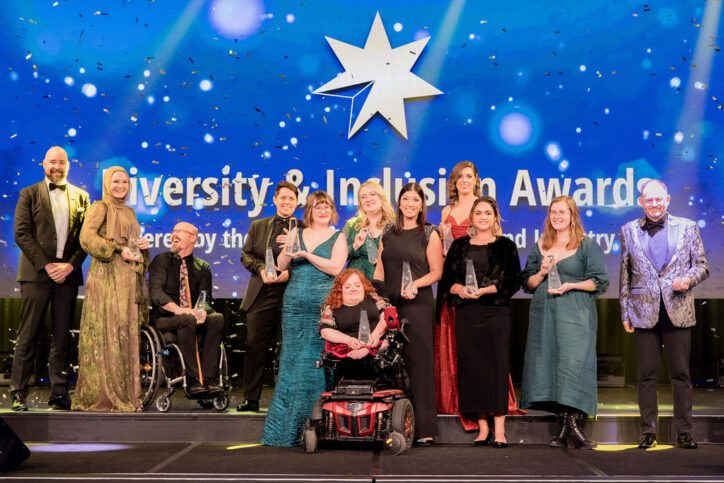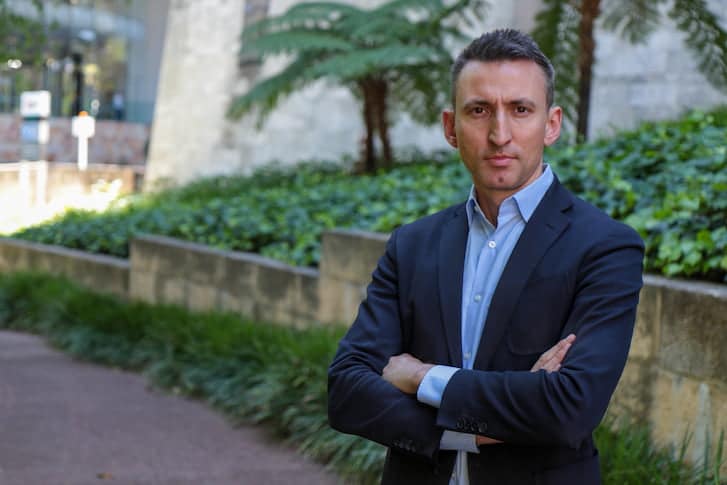Employers are being urged to do more for the vast majority of Western Australians with a disability who aren’t eligible for assistance under the National Disability Insurance Scheme.
At a Disability Inclusion Seminar on Wednesday, Mike Rowe, the Director-General of the Department of Communities, said there were more than 400,000 people with a disability living in WA, but only 48,000 of them were eligible for NDIS help.

Chris Rodwell speaks to attendees.
Rowe noted that employers gain certain benefits by employing people with disabilities — they have better attendance records, and stay longer with their employers.
Rowe said he wanted to increase the proportion of people with disability in the public sector to five per cent to make the sector as inclusive and diverse as possible.
“We need to increase the level of people with disability across all areas — and that’s the responsibility of boards and leadership teams,” Rowe said.
“We all have a role to play.”
CCIWA CEO Chris Rodwell shared his own personal experiences with disability, telling attendees one of his four children has Downs Syndrome, and another has an intellectual disability that remained undiagnosed for some time.
“We’re thankful to live in this country with the support it offers, but we always need to do more,” Rodwell said.
“We must have optimism while not ignoring the serious challenges we face. It’s great to see so many employers here taking leadership on an issue like this. There’s no better time than right now.
“It might be a function of the employment environment, but it’s also about so many communities coming to terms with diversity and inclusion and how fundamental it is to our State.”
It’s about attitude
In a panel discussion, DeafBlind WA Chair Rita Kleinfeld-Fowell said that while it was great to have the NDIS in place, unfortunately the scheme doesn’t offer support to people who need employment.

Rita Kleinfeld-Fowell speaks on the panel.
“It’s important to change the attitude of society around negative expectations of people with disability,” Kleinfeld-Fowell said.
“It’s about attitude. Employers are more interested in my dog than my abilities — as soon as they see the dog or the white cane or the wheelchair, it’s the concept of being medically novel.
“I think employers, both private and public must understand we have limitations, but it’s about getting around those limitations. And it doesn’t have to cost money — it may be having a black felt tip pen so I can see my writing. Educating and providing opportunities is vital.”
Good Sammys CEO Kane Blackman said there was now a greater awareness of the challenges and barriers people with disabilities face, which was partly a result of the NDIS, but there was still a need to increase the visibility of disability.
Overseas workers not the only solution
At a time of record low unemployment rates, governments and employers were chasing overseas workers, but people with disability are still highly under-represented in the workforce — as low as one per cent in the private sector.
“All we need is those in hiring positions to say that I want to improve my workforce so it better reflects my customer and stakeholder base,” Blackman said.
He noted that 45 per cent of Good Sammys employees had disabilities, and it was possible to customise roles to suit people who needed additional support.
It was also important to focus some reporting attention on it.
“All businesses can report on women in leadership roles and their proportion of Indigenous employees — we need to focus on people with disability too,” he said.
“Make sure your job ads are inclusive, call out the accessible nature of work, and you can target people with disability specifically for roles.
“Partner with disability service providers. It’s not only direct employment, think about the casual employment, temporary, and apprenticeship opportunities for people.
“There are a number of different levers business has to encourage disability employment.
“There’s a lot of focus on ESG [environmental, social and governance issues] at the moment — this is part of the ‘S’. Differentiate yourself as an employer of choice. It sets a business apart and there’s a great opportunity there.”
Rodwell said it was important to not underestimate the amount of employer stage fright around the issue.
“Every person with disability is different and a lot of employers have stage fright knowing this. They need to know it’s ok to get things wrong sometimes as long as there’s an openness to learning.”
For general employee advice and guidance, contact CCIWA’s Employee Relations Advice Centre on (08) 9365 7660 or email [email protected].






